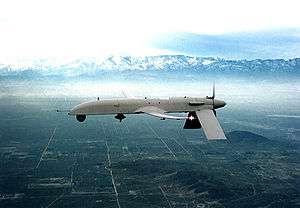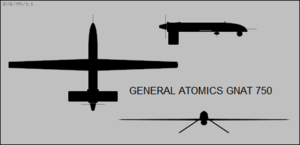General Atomics GNAT
The General Atomics GNAT is an aerial reconnaissance UAV developed in the United States in the late 1980s and manufactured by General Atomics Aeronautical Systems (GA-ASI). As initially designed, it was a simplified version of the LSI Amber intended for foreign sales. The GNAT 750 made its first flight in 1989.
| GNAT | |
|---|---|
 | |
| Role | Reconnaissance UAV |
| National origin | United States |
| Manufacturer | General Atomics Aeronautical Systems |
| First flight | 1989 |
| Introduction | Early 1990s |
| Status | Active |
| Primary user | CIA |
| Produced | 1989-? |
| Number built | 22+ |
| Developed into | General Atomics MQ-1 Predator |
Design and development
The GNAT 750's configuration was similar to that of the Amber, except that the GNAT 750's wing was mounted low on the fuselage, instead of being mounted on a pylon on top. The GNAT 750 was somewhat larger than the Amber, but weighed less and could carry a heavier payload. Even though the name "GNAT" can be thought of as a contraction of GeNeral ATomics, the original name of the developing company before its acquisition by General Atomics was Leading Systems Incorporated (LSI). The idea of the name was more probably related to the fact that a gnat is small. The "750" part of the name stands for the distance in millimeters from the leading edge to trailing edge of the wing near the wing root.
The aircraft is powered by a Rotax 912 piston flat-four four-cycle engine with 64 kW (85 hp). It can fly to an operational area from 2,000 kilometers (1,240 miles) away and loiter there for 12 hours before returning home.
Eight GNAT 750s were in development when General Atomics bought out LSI. General Atomics continued the program, which led to a contract from the Turkish government for a number of the UAVs in 1993. The Turkish Air Force operates 6 GNAT-750 and 16 I-GNAT ER unmanned aerial vehicles.[1]
By this time, the breakup of the old Communist states of Eastern Europe was in full swing, and the United States government wanted to obtain an intelligence asset to help it deal with trouble spots in the region, specifically the former Yugoslavia. A contract was issued to General Atomics for GNAT 750s with minor modifications. The aircraft were to be operated by the CIA.
The program encountered a number of difficulties, much of them due to bureaucratic factionalism and squabbling. One aircraft crashed during tests when it was hit by a gust of wind, causing it to indicate zero airspeed. The UAV's software decided that meant it had landed and shut down the engine, causing the GNAT to fall to earth.
The GNAT 750 effort squeaked through, and in early 1994 the CIA sent a team equipped with a GNAT 750 to Albania to monitor events in the former Yugoslavia. The operation was not a success. The aircraft suffered from a number of bugs and was limited by bad weather, and the team was finally withdrawn. However, the GNAT 750 continued to be built, leading to an "Improved GNAT" or "I-GNAT" variant, with a turbocharged engine and general overall refinements to increase reliability, reduce maintenance, and enhance capability. The GNAT 750 also led to a next-generation derivative, the "GNAT 750-45", much better known as the Predator.
Prowler
General Atomics also used the GNAT 750 as the basis for a tactical UAV known as the "Prowler". It appears similar to a GNAT 750, but is smaller, with a wingspan of 7.31 meters (24 ft) and a length of 4.24 meters (13.9 ft). It has an endurance of over 16 hours, and some commonality with GNAT 750 subsystems.
Operators


Specifications (GNAT 750)

Data from
General characteristics
- Length: 16 ft 5 in (5.00 m)
- Wingspan: 35 ft 4 in (10.77 m)
- Height: 2 ft 4.5 in (0.724 m)
- Empty weight: 560 lb (254 kg)
- Gross weight: 1,140 lb (517 kg)
- Powerplant: 1 × Rotax 582 , 65 hp (48 kW)
- Propellers: 2-bladed constant-speed pusher propeller
Performance
- Maximum speed: 104 kn (120 mph, 193 km/h)
- Endurance: 48 hours
- Service ceiling: 25,000 ft (7,600 m)
References
This article contains material that originally came from the Web article Unmanned Aerial Vehicles by Greg Goebel, which exists in the Public Domain.